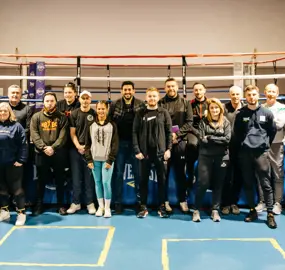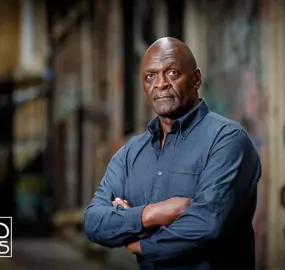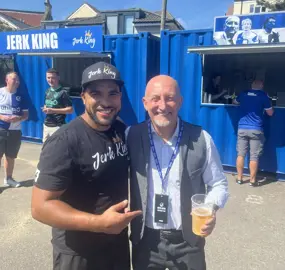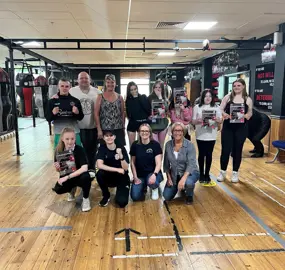Former female boxing champion is next Empire Community Ambassador
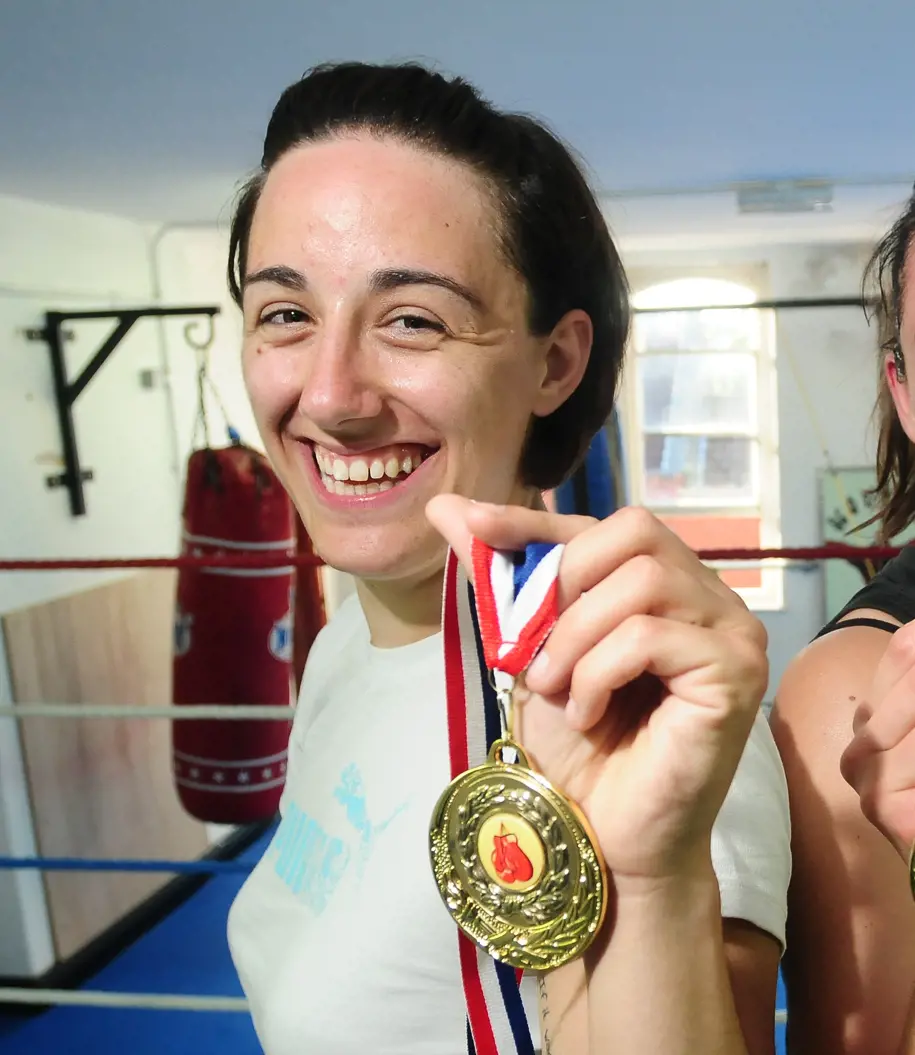
This year we are celebrating the community champions of yesterday, today and tomorrow.
We are selecting Community Ambassadors for Empire Fighting Chance.
People who have played a strong role with the charity and the wider club.
And next up is Lisa Perryman.
Lisa is a former amateur boxer who was one of the first female boxers to represent England from the region. She also played a coaching role at the club in the past.
Today she is a Police Officer.

What’s your connection to the charity?
I used to box for Empire ABC and near the end of my time boxing I coached for them. I also did outreach coaching for them in schools and at UWE and in particular, ran the girls and young women sessions.
Tell us about your experience and career as a boxer?
I started boxing in 2002/2003, I’d been Thai Boxing for a couple of years prior but stopped and struggled to get back into it so I decided to give boxing ago. I still remember the first time I walked into my first boxing club as someone that never quite felt like they’d fitted in anywhere, I felt like I did there.
For many, many years I was the only female in that club but I was really lucky and never felt like I wasn’t welcome. For personal reasons I left that club and joined Empire ABC and again, I felt like I fitted in straight away. I also added another level to my boxing ability by being at Empire.
When I first started competing there were hardly any other females boxing, especially in the southwest. In the first half of my amateur career, I think I averaged one bout per season and there were no county or national standard competitions. I entered my first national championship in 2007/8.
Unfortunately, I didn’t win but there were representatives from the England setup in attendance and I’d made a big enough impression to be invited to their training camps and in 2008 I boxed for England and won a silver in the European Union Competition.
That set me up with the training and confidence I needed to win that national title the following year. At this point I was happy with everything I had achieved and I was ready to focus on coaching others. Not long after making this decision I received a letter from GB Boxing inviting me to attend selection for the 2012 Olympics, this would be the first-time female boxing would be an Olympic sport.
I didn’t quite make the cut but the experience and the invite is still an honor.
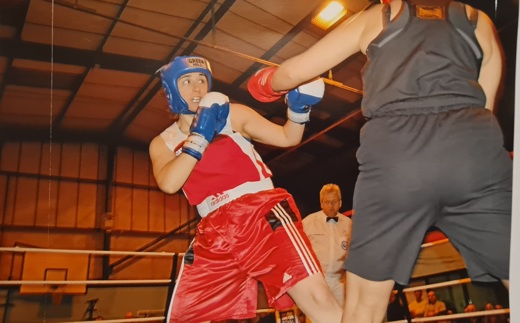
What was your experience being a woman in boxing, and do you think strides have take place today?
Although I was the only female in the club when I started, I never felt like I wasn’t welcome and I was treated the same way as the males. I think I placed higher expectations on myself, and I did feel like sometimes I had to work that extra 10% to be viewed as equal by some. I think it was also a steep learning curve for both me and my coach at the time with regards to things like, needing different safety kits, making weight and learning differently. I do remember hearing snide comments made by audience members while on my way to the ring at some competitions, as well as there being ring-girls between bouts during amateur shows.
However, huge strides have taken place, I saw it happen during my years of boxing. I watched more girls and young women come into the sport, I watched as more local, national and international competitions included females and there are now six weight categories planned for the Paris Olympic games with an equal quota of 124 for both men and women.
There is still plenty of work to be done, but that’s across all sports in general and not just boxing.
How did boxing help you?
I have no doubt that I wouldn’t be who I am now and have achieved what I have, had it not been for boxing. The reason that I got into combat sports in the first place was because I was bullied at secondary school.
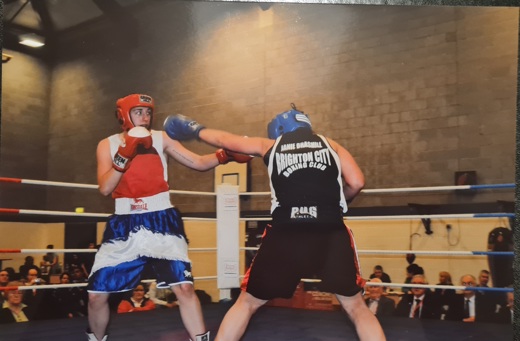
Initially I wanted to be able to defend myself but boxing became about so much more than that in the way that I held and carried myself.
The discipline that I took from boxing fed into all aspects of my life. Prior to boxing I was hanging out with the “wrong” kind of people and getting into a little bit of trouble both in and out of school. Boxing stopped all of that. I had somewhere to go, something to do, a group of people and a club to belong to.
I worked hard at boxing and I worked hard at school, I went to college, I went to university and achieved things I never even considered someone like me could.
What advice would you give young girls going into boxing?
It sounds a bit of a cliché, but just don’t give up and if someone says “you can’t,” prove them wrong. You have every right to be boxing at whatever level you choose. From a more practical level, make sure you have the correct safety kit and it fits well, your future self will thank you.
Finally, remember the help and support that you receive as a beginner because there will come a time when it’ll be your turn to do that for the newbies.
What impact does non contact boxing have for young people involved in anti-social behavior?
Non-contact boxing can be used as a hook to engage young people in positive activities. While doing this, it provides an opportunity and platform to have conversations with young people, to talk to them and educate them in an informal way. It can also provide role models for young people, discipline where none exists and somewhere to go.
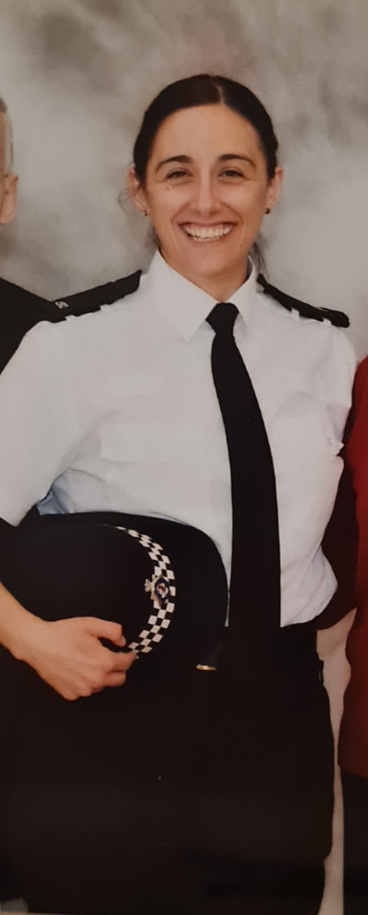
What have you done in your professional working career since finishing boxing?
I was fortunate enough to receive financial support to go to university where I studied sports development. While there I did a lot of voluntary sports coaching in my community which enabled me to access more coaching qualifications. On leaving university I secured a 12-month apprenticeship with a county sports partnership.
After that I moved to North Somerset Council where I was a sports development officer which involved sports coaching, mentoring and developing projects that used sport as a tool to engage with young people in local communities. In 2014 I decided that I needed a change so I took a 12 month sabbatical. During this time I worked for a charity called TackleAfrica and moved to Narobi, Kenya where I continued to work as a development officer.
On returning in 2015 I went back to my old job at the council but due to my experiences in Africa I felt differently about my career and my priorities. It was shortly after, that I decided to apply to become a police officer and a number of months later I started my training. I have now been a police officer for roughly eight years.
My main drive regardless of my career path has always been to try and make a difference. Sport had such a huge impact on my life, I wanted to try and use it to help others and now I still want to help people, but I just use a different method.
You are on the wall at Empire, how does that make you feel?
I didn’t realise I was on the wall for quite some time, until a friend mentioned it and I noticed prior to a coaching session. It makes me feel proud and honoured that my achievements have been recognised by Empire. Especially as I wasn’t even involved with the club at this time and they still included me in their history.
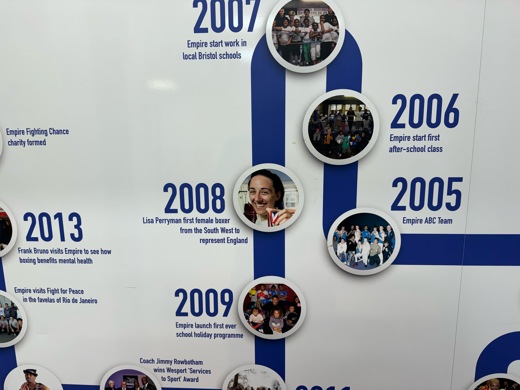
Tell me about the heritage of the club – its champions. And how does that help young people walking in the building?
If you’re from Bristol it's very likely that you know of Empire and Bristol Boxing Club. Its history is embedded into Bristol and has a reputation for producing great boxers. Young people walking into the club are reminded of this with pictures on the walls and even get the opportunity to meet and be coached by some of these.
It shows young people what is achievable with hard work and dedication, both of which can be applied outside of the sport. I’d like to think it inspires young people and provides them with motivation.
Why did you decide to become a Community ambassador at Empire Fighting chance?
I used to be more involved as a coach but due to my job and shift work that became much harder to commit to. This allows me to still give back to the club that supported me as a boxer and support the young people involved with Empire Fighting Chance in my hometown. I
I'm also particularly passionate about the work that they do with girls and young women and hope to have, even a small impact, in some way, within this area.
If I gave you £50m how would you change the city?
I would invest it in more youth clubs, groups and activities for young people and a workforce to run these clubs. These would be safe places for young people where they could use the space but also focus on educating them about subjects that directly affect them.
You can find out more about the Empire Fighting Chance Community Ambassador project here.

